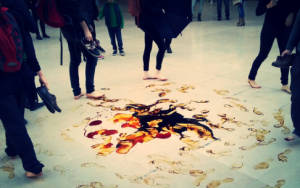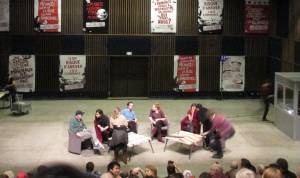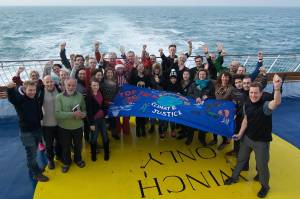Two weeks ago, tens of thousands of climate activists from across the world gathered in Paris to mobilise around the COP21 climate summit. Among these thousands were hundreds of divestment activists, many of whom had never been to a COP or taken part in mass mobilisations around climate change at all. These are some of their reflections on the experience…
Sam Martin, Divest Bexley
“Sometimes you’ve got to put the boots in the closet and get on your suit,” a Dutch divester advised an audience of campaigners in the Paris Climate Action Zone. Suits vs. boots sums up the divester’s tightrope walk, the challenge of combining a passionate grassroots campaign with a financially-literate, ‘professional’ public front. It was a privilege to listen to his story of unlikely success alongside a “worn-out” but inspiring Bill McKibben and a panel of young climate activists.
Paris was the time for armchair campaigners like me to hang up the suit and take to the streets. I freely admit to preferring strategy and planning to slogans and chanting but was truly moved by the impromptu march to the Eiffel Tower. The uncertainty of endless briefings and whispers melted away in a spirited spontaneity. I felt huge respect for the organisers who faced down powerful pressure and insisted that climate change protest would not be silenced.
Rob Abrams, Oil Vey
I went to Paris with a mind to get involved in creative, arty protest, which led me to link up with a group of people upset about the Louvre’s partnership with two oil companies.
At around Midday on the 9th, 10 of us entered the Louvre. Convening in the main hall, molasses (a gloopy, sugar-based, oil-like substance) was poured on the floor, while the rest of us removed our shoes and begun walking through it. Singing in unison, we called on the Louvre to drop its oil sponsorship. Meanwhile, hundreds of activists gathered outside the pyramid, displaying the slogan ‘fossil free culture’ written on black umbrellas. This action led to the arrest of the 10 of us inside the Louvre, however, once the police realised that the molasses had been chosen so as not to cause any structural damage, we were discharged.
The lesson that was reaffirmed for me by this action was the tactical importance of creative, performance-actions. Not only are they enjoyable to organise and participate in, they create a friendly spectacle for members of the public who might rarely engage in direct action. My two-cents from a week in Paris is; join an art not oil action, no one will forget it, least of all execs of galleries and museums that prop up fossil fuel brands.
Anne Maljaars, Fossielvrij Nederland
Mixed emotions. Should we be glad with the agreement reached in Le Bourget? The goals that were set are definitely not enough to keep us within the 1.5 degree global warming, but it is an huge improvement compared to what we had.
On Thursday I attended a beautiful closing ceremony of Run for your life at Notre Dame where Sami and Pacific Islanders told their story about their fight against climate change. The ice that is melting in Lapland is the sea level that is rising in the Pacific. Will this agreement be sufficient for frontline communities? Definitely not. Will these words on paper turn out to be hollow phrases? I’m afraid so. Does this mean our struggle is futile? Definitely not.
Seeing that over 15,000 were willing to go into the streets despite the state of emergency gave me hope. That I was there with so many of my friends was even better. I’m happy that I helped to arrange a Fossielvrij NL bus to Paris. Having this experience makes me even more determined to step my game up a notch.
Martin Hawkes, People’s Climate Ireland
I had two contrasting but related experiences in Paris – of powerlessness and empowerment.
The first on arrival by ferry in Cherbourgh when our group of 35 was ordered to turn around and return home on the next ferry. Our crime – we might demonstrate in Paris which was forbidden under the emergency powers. One and a half hours later, having plied the phones to media and politicians at home. the decision was reversed and we were on our way to Paris. However, the initial sense of powerless in the face of the arbitrary use of state power was unsettling and unusual for those of us privileged to live in a liberal democracy.
I couldn’t help but be impressed by the opposite experience during the ‘red lines’ demonstration on Saturday the 12th. State power yielded in the face of people power which was going to make itself felts irrespective of whether the state gave formal licence or not. The overwhelming sense was of a ground-up assertion that the world’s governance structure had failed us and that ‘we the people’ were the only bulwark against forces leading inexorably to the edge of a climate precipice. The sheer joy, creativity and clarity of the demonstration was an empowered expression that civil society was awakened and was on its way.